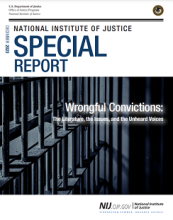Literature
Celebrating 10 Years of NIJ’s Law Enforcement Advancing Data and Science (LEADS) Scholars Program - 2024 NIJ Research Conference
In 2014, NIJ established the Law Enforcement Advancing Data and Science (LEADS) Scholars Program to support research-minded, mid-career sworn law enforcement officers working to integrate research into agency policy and practice. The LEADS Scholars Program helps participants develop independent research and provides support to identify current evidence on priority issues.
See the YouTube Terms of Service and Google Privacy Policy
Webinar Transcript: Fiscal Year 2024 Evaluating Strategies to Advance the Implementation of Evidence-Based Policies and Practices Solicitation
This webinar provided an overview of the NIJ FY 2024 Evaluating Strategies to Advance the Implementation of Evidence-Based Policies and Practices solicitation, in which...
Wrongful Convictions: The Literature, the Issues, and the Unheard Voices
Mechanisms of recruitment into sex trafficking operations: a systematic review
Disengagement from Ideologically-based and Violent Organizations: A Systematic Review of the Literature
Desistance From Crime: Implications for Research, Policy, and Practice
Most scholars would agree that desistance from crime – the process of ceasing engagement in criminal activities – is normative. However, there is variability in the literature regarding the definition and measurement of desistance, the signals of desistance, the age at which desistance begins, and the underlying mechanisms that lead to desistance. Even with considerable advances in the theoretical understanding of desistance from crime, there remain critical gaps between research and the application of that research to practice.
See the YouTube Terms of Service and Google Privacy Policy
School Safety Considerations for Distinct Student Populations - Breakout Session, NIJ Virtual Conference on School Safety
On February 16-18, 2021, the National Institute of Justice hosted the Virtual Conference on School Safety: Bridging Research to Practice to Safeguard Our Schools. This video includes the following presentations:
See the YouTube Terms of Service and Google Privacy Policy
What We Know About Social Structure and Homicide: A Review of the Theoretical and Empirical Literature
The Neurobiology of Sexual Assault: Implications for Law Enforcement, Prosecution, and Victim Advocacy
Dr. Campbell brings together research on the neurobiology of trauma and the criminal justice response to sexual assault. She explains the underlying neurobiology of traumatic events, its emotional and physical manifestation, and how these processes can impact the investigation and prosecution of sexual assaults. Real-world, practical implications are examined for first responders, such as law enforcement, nurses, prosecutors, and advocates.
See the YouTube Terms of Service and Google Privacy Policy
Benefit-Cost Analysis for Crime Policy
How do we decide how to allocate criminal justice resources in a way that minimizes the social harms from both crime and policy efforts to control crime? How, for that matter, do we decide how much to spend on the criminal justice system and crime control generally, versus other pressing needs? These questions are at the heart of benefit-cost analysis.
See the YouTube Terms of Service and Google Privacy Policy
Forensic Aspects of Elder Abuse
This NIJ Conference Panel will feature the latest research on forensic aspects of elder abuse detection and prosecution. Panelists will discuss results from a recently completed study that examined the characteristics of pressure sores on elders who received quality care, emphasizing how this research informs the field about the warning signs of potential neglect. Panelists will also present findings from a study on how well elderly individuals with mild or moderate dementia remember emotional events.
What Works in Reentry
See the YouTube Terms of Service and Google Privacy Policy



